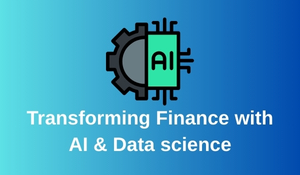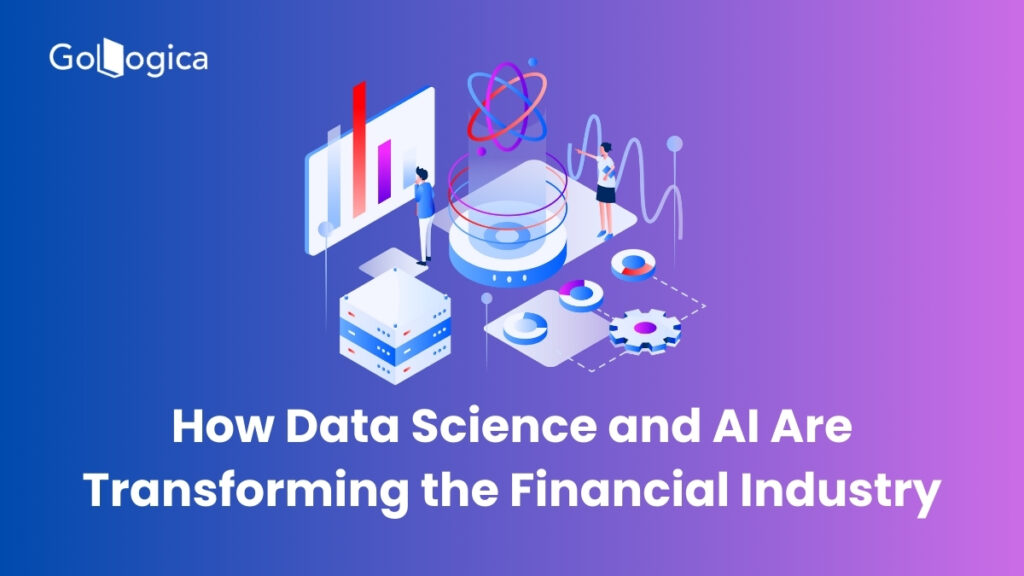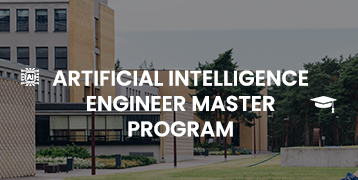
Table of contents
- Introduction
- The Digital Shift in Finance
- Role of Data Science in the Financial Industry
- How AI Is Disrupting Traditional Financial Models
- Fraud Detection and Prevention
- AI-Powered Credit Scoring and Loan Approval
- Customer Service with Chatbots and Virtual Assistants
- Enhancing Investment Decisions
- Data Security and Compliance
- Future Trends and Opportunities
- Skills Needed to Work in Financial AI
Introduction of AI and Data Science is Transforming the Financial World
Artificial Intelligence (AI) and Data Science are transforming the financial world by improving decision-making, sophisticated risk management, and enhanced customer experience. Sophisticated analytics and machine learning capabilities enable financial institutions to dive deep into enormous data to detect fraud, predictive modeling of market trends, and more personalized products. A computer program based on artificial intelligence provides automated trading and manages it more effectively and at a lower cost. Loan sanction, credit rating, and investment are some of the data models that can enhance their performance over time. Virtual assistants and chatbots enhance customer service with real-time feedback and tailored financial advice. So, the union between Data Science and AI is revolutionizing the banking, insurance, and investment house business operations to be innovative and competitive amidst a dynamic fluctuating market. The revolution not only helps them become profitable but also monitors compliance as well as maintains cybersecurity controls, a paradigm shift for the financial sector.

The Digital Revolution in Finance
Finance is also going through a tremendous digital transformation, transforming the way people save and keep money. As technology has improved, banks and other financial organizations are employing digital media to deliver faster and more accessible services. Mobile banking apps, online payments, and electronic wallets have made people capable of managing their money anywhere. Firms are, however, leveraging data and artificial intelligence to make better choices, identify cheats, and provide more tailored services to customers. It is also simplifying, reducing expenses and protecting oneself. The conventional banks are fighting a losing battle against fintech firms and online banks today. Therefore, customers are seeking immediate, safe, and hassle-free financial services. The financial shift to the digital world is less about new technology and more about creating a superior user experience and supporting businesses to prosper in an increasingly changing economy. It is transforming the face of finance.
Role of Data Science in the Financial Industry
Data Science has an interesting role to play in the financial industry by empowering organizations to make data-driven decisions. It helps financial institutions and banks to measure the behavior of consumers, reduce risks, and enhance services. For example, data science detects fraud because it can see that the patterns of transactions are beyond normal. In confirms the credit scores by establishing whether they should lend or not. Data is used by financial institutions in forecasting risk in markets and making wise investment choices. Data science helps them to deliver services customized to the consumers based on their spending. It helps them to drive a lot of processes automatically, which is time-saving and cost-effective. Customer service has also been improved with the use of chatbots by applying data that offers quick and accurate answers. Overall, data science makes the financial industry efficient, safe, and consumer-centric. It helps companies stay competitive in the marketplace with better and faster decisions informed by data.
How AI Is Shattering Traditional Financial Models
AI is shattering traditional financial models by making them smarter, faster, and more accurate. Traditional financial models were previously built on static rules and historical facts. Presently, AI helps them learn from new data and become smarter with time. This helps banks and financial institutions to make better investment, lending, and risk management decisions. AI is also easy to incorporate in fraud detection since it can detect patterns within atypical transactions. Past systems would be a huge time and effort investment to retrain, but AI can easily adapt to the continuously changing marketplace. AI chatbots are also replacing human customer support agents with immediate responses. On the whole, customer orientation and financial services are being improved through AI. There is less error, saved time, and companies’ capability to stay competitive. With further development in AI, it will keep on transforming the financial sector’s operations.
Fraud Detection and Prevention
Fraud detection and prevention are extremely important in the finance sector. Banks and financial institutions can detect and block fraud more thoroughly and precisely with the help of Artificial Intelligence (AI) and Data Science. AI applications can scan through datasets to detect rare patterns or suspicious activity, for example, identity theft or credit card theft. They get wiser over time based on past fraud cases. For example, if your card has been swiped elsewhere in the world when you’re at home, then the system can flag it as possible fraud and inform you. This protects customers and prevents losses. AI also allows real-time monitoring, i.e., it can detect fraud in real time. Banks can make their systems secure and win the trust of their customers using such smart technologies. It accelerates fraud detection quicker, quicker, and more efficiently than humanly possible.
AI-Based Credit Scoring and Lending Approvals
AI-based credit scoring and lending approvals are transforming the way lending approvals and credit scoring occur in financial institutions and banks. Apart from mere contemplation of basic information like credit scores and earnings, AI systems can also operate on a high level of variety of data, ranging from spending patterns, payment history, social conduct, down to mobile usage patterns. Through this, the lenders can determine if the borrower will be able to pay back the loan. The technology can process this information faster and come up with quicker and better results compared to the conventional processes. It also eliminates human mistakes and bias when approving the loans. This means that more individuals, particularly those with thin credit files, can access the loans. The technology also allows for fraud detection and risk management. This means faster service and reduced customer dissatisfaction for lenders. Overall, credit scoring and lending approval by artificial intelligence make lending smarter, balanced, and efficient for lenders and borrowers.
Customer Service through Chatbots and Virtual Assistants
Chatbots and virtual assistants are revolutionizing customer service in certain sectors, particularly the finance and banking industry. The technology uses Artificial Intelligence (AI) to interact with customers, resolve queries, and solve issues within minutes. They are available 24/7, so customers can be served at any time without waiting for a human representative. The tasks that can be carried out by chatbots are validating the balance of a given account, making payments or bill payments, or providing information regarding loans. Virtual assistants are highly sophisticated and can provide personalized suggestions based on a customer’s requirements. They are experience-based learners and improve their performance over time. The utilization of such facilities is cost- and time-effective for the company, and provides good services to customers. Customers expect immediate responses and simple solutions to issues. Chatbots and virtual assistants will continue to become smarter and useful with the help of advancing technology. They will be an undeniable feature of customer service in today’s world and are making the overall customer experience more valuable.
Improved Investment Decisions
Artificial Intelligence (AI) and Data Science simplify and make accurate decisions for investments. Both technologies enable financial analysts and investors to search through giant data sets in a matter of seconds. The AI program can assess the direction of the market, performance of companies, news, and recommend the best investment opportunity. It reduces risk and increases returns. Machine algorithms also forecast what stocks and other investments are going to do in the future, thus smarter investment plans are achievable. AI robo-advisors can even make investment suggestions depending on the risk appetite and investment goals of an investor. It is also easy for investors who may not be very knowledgeable about investments. Investors make their choices based on better information and react faster to market changes due to AI and data usually revolutionize how one invests such that they make better choices and attain their money objectives better.
Data Security and Compliance
The Data compliance and data security are extremely significant these days with the technology era, particularly for sectors such as financial services, the healthcare industry, and technology.
Data protection is the process of ensuring that individual data remains secure against hackers, data loss, or abuse. It involves the use of secure passwords, encryption, firewalls, and safe networks. Compliance refers to the practice of obeying legislation and regulations that cover the utilization, storage, and capture of data. Some examples include GDPR in the EU and HIPAA in the US. The law on compliance protects consumer privacy and guarantees firms will use data responsibly. Companies must keep systems updated, run security scans, and train staff regularly to remain compliant. If they don’t, they can invite legal trouble, steep penalties, and customer loss. Combining compliance and security reduces the cost of compliance across the board, allowing organizations to remain secure, gain the trust of users, and prevent serious problems. Briefly, data security makes the data secure, while compliance makes sure that the companies do so according to the law. Future Trends and Opportunities.
The future of Data Science and AI in banks is extremely bright.
The biggest trend is employing AI to offer customized services to customers, i.e., investment advice and planning as per their needs. Automation will also be more widespread, which will save time for companies and banks and reduce errors. Fraud detection will be enhanced by AI as it will detect suspicious patterns in seconds. Real-time decision-making and quicker, smarter decision-making are also among the biggest trends. Open banking and the employment of AI to handle groups of large customer data will liberate new services and potential. Data scientists and AI professionals are also in demand. With advancing technology, even small financial institutions and banks will be able to leverage the capabilities of advanced AI solutions. All these combined will make the banking sector more efficient, secure, and customer-focused with plenty of interesting potential in the future. Technical and Finance-Specific Skills to Work with Financial AI
To work with Financial AI, you require technical and finance-specific skills.
You start with programming languages such as Python or R, where you use to create AI models. Using data analysis and statistics skills, you can evaluate the financial data. Machine learning algorithms are also something you should know because they enable AI to learn and adapt over time by using data. You must also learn finance, like how markets function, banks, and the foundations of investments. SQL or Hadoop are a plus to learn when it comes to dealing with big data because financial information can be quite huge. Communication skills are also excellent so that you can break down complicated things for others. Lastly, critical thinking and problem-solving help you construct intelligent solutions for financial problems. With these competencies, you can succeed in the rapidly rising Financial AI industry.
Conclusion:
Data Science and AI are deeply changing the financial services industry with more intelligent, faster, and
almost infinitely customizable decision-making across the board. These technologies give institutions the
power to take enormous amounts of data, find patterns, and create predictive insights leading to a
strategic competitive advantage. When it comes to fraud detection, AI models can detect any number of
anomalies in real-time so that organizations can mitigate those exposures before they become
catastrophes. For credit scoring, machine learning is providing a much more accurate means of
customer accountability assessment while reducing bias and improving inclusion. Robo-advising, or
algorithm-backed portfolio recommendations, is fast-changing how investment services interact with
customers. AI-powered chatbots and data entry automation can reduce the need for human costs in
the customer service channel. Regulatory compliance, a major contributor to overhead costs, is significantly reduced through intelligent monitoring and reporting of all the data being fed from the business.










